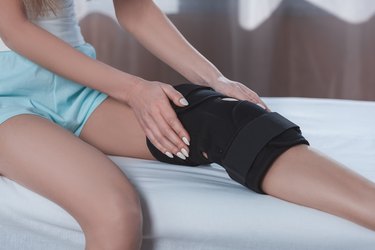
Many people believe that wearing a neoprene exercise vest will help them quickly lose weight. Yet neoprene works better as a compression sleeve to decrease pain and prevent injury. Learning about exercising while wearing neoprene will help you make wise health decisions.
Read more: Compression Pants vs. Running Shorts
Video of the Day
Video of the Day
Use a Neoprene Sweat Vest
You can buy a sweat vest in stores, but it won't come with documentation showing that it works. The authors of a January 2016 report in the International Journal of Research in Exercise Physiology tested 12 healthy men wearing a neoprene sauna suit. The subjects exercised for 30 minutes five days a week. After six weeks, these workouts caused improvements in body composition, blood pressure and cholesterol.
Yet neoprene garments can alter your breathing, according to a September 2016 paper in Diving and Hyperbaric Medicine. These researchers tested 28 subjects and found that a 3-millimeter-thick, full-body wetsuit placed undue stress on the participants' chests. You can decrease this unwanted effect by using thinner and smaller garments. A thin neoprene T-shirt, for example, should have less effect on your breathing than a full-body wetsuit.
Neoprene garments can cause other problems as well. The authors of an article in the March 2019 edition of Heat Stress in Sport and Exercise stated that wetsuits decrease heat loss during intense exercise. This physiological change can elevate your core body temperature and cause dehydration. Thus, some triathlon competitions have banned their use in warm waters. If you use them, please drink abundant fluids to keep a proper level of hydration.
Read more: 10 of the Most Common Weight-Loss Mistakes
Try Neoprene Braces and Insoles
Given these possible issues, you might want to explore other exercise-related uses of neoprene. The writers of an April 2015 paper in Arthritis Care and Research evaluated the data of 274 people who had used a neoprene knee brace. The results indicated that using a rubber brace decreases feelings of pain in arthritis patients. Unlike using a sauna suit, wearing a knee brace doesn't have any disadvantages.
For example, the authors of a November 2012 article in PLOS One tested 31 healthy adults and found that this type of brace doesn't have a negative effect on athletic performance. A neoprene sleeve also doesn't alter proprioception or the natural feel you have for your sport. Thus, a rubber brace won't limit your abilities when you use it to gain more support.
A neoprene wrap might also help you avoid injury. The authors of a September 2013 review in Physician and Sportsmedicine showed that braces can prevent some knee injuries and can help you recover from knee surgery. Neoprene insoles can also help you prevent lower body overuse injuries, according to a June 2013 paper in Military Medicine. These researchers showed that shock-absorbing insoles decrease Achilles tendinitis, stress fracture and knee pain.
Consider Lower Body Positive Pressure
Neoprene has many other exercise-related uses as well. The authors of a December 2013 paper in the International Journal of Physical Medicine and Rehabilitation explored the effect of doing lower body positive pressure exercise in 13 older adults previously unable to walk. For this type of treadmill workout, you inflate neoprene shorts to increase your buoyancy and greatly decrease your ground reaction forces.
With this device, the added buoyancy will decrease your impact up to 80 percent of your real body weight while you walk on a special treadmill. Fortunately, this change doesn't affect your blood pressure, heart rate or gait. So, you can still reap the many benefits of cardiovascular exercise. Decreasing your load in this way will let you gradually gain the fitness you need to successfully exercise on a consistent basis.
The older adults tested in the International Journal of Physical Medicine and Rehabilitation study had more muscle mass and less pain after doing lower body positive pressure exercise for one month. The exercise also improved their walking speed. Amazingly, the participants only had to use the special treadmill a few minutes each week.
Patients with knee osteoarthritis can also benefit from this type of training, according to a July 2013 article in Clinical Interventions in Aging. These researchers tested 22 overweight adults and found a clinical benefit of using the lower body positive pressure device. Decreasing body weight 12.4 percent caused a significant decrease in knee pain during a 20-minute walk.
- International Journal of Research in Exercise Physiology: "Effects of Exercise Training with a Sauna Suit on Cardiovascular Health"
- Diving and Hyperbaric Medicine: "Influence of the Diving Wetsuit on Standard Spirometry"
- Heat Stress in Sport and Exercise: "Triathlon and Ultra-Endurance Events in Tropical Environments"
- Arthritis Care and Research: "Valgus Bracing for Knee Osteoarthritis"
- PLOS One: "Effects of a Prophylactic Knee Brace and Two Neoprene Knee Sleeves on the Performance of Healthy Athletes"
- Physician and Sportsmedicine: "Anterior Cruciate Ligament Bracing"
- Military Medicine: "Shock-Absorbing Insoles Reduce the Incidence of Lower Limb Overuse Injuries Sustained During Royal Marine Training"
- International Journal of Physical Medicine and Rehabilitation: "Acute and Chronic Effects of Lower Body Positive Pressure Exercise on the Very Elderly"
- Clinical Interventions in Aging: "Lower Body Positive Pressure"